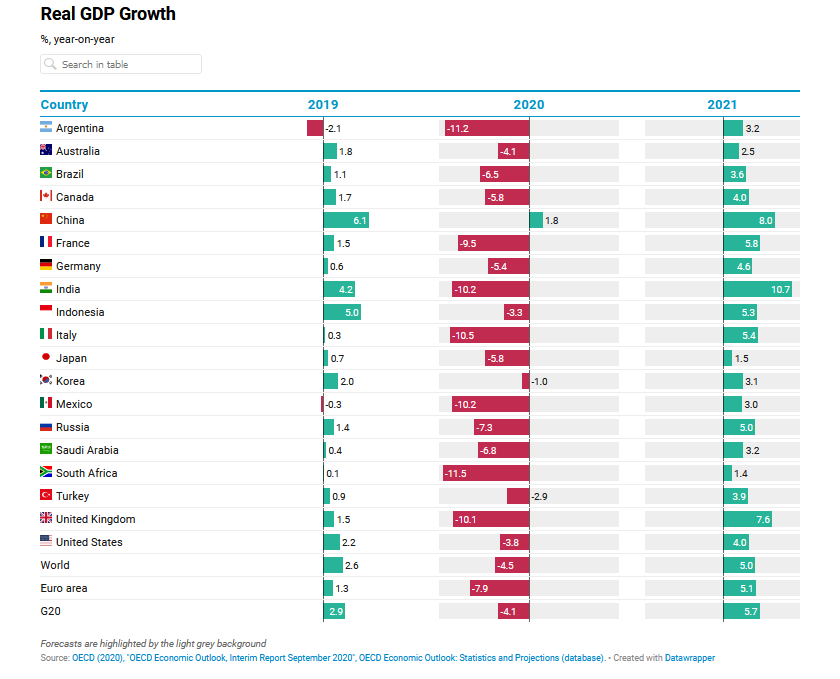Thriving in the Post Covid Era: How Businesses Can Leverage Technology for a Competitive Edge

Covid-19 threw the proverbial monkey wrench into the world’s economic system, with forecasted global 2020 Gross Domestic Product (GDP) falling more than 17% from 2019.
Despite a turnaround in the last half of 2020, health officials are concerned about a second round of the pandemic that might reverse the recovery to date. According to the Organization for Economic Co-operation and Development (OECD), many countries expect a comeback in 2021 though outputs will be below 2019.

Source: http://www.oecd.org/economic-outlook/
The International Monetary Fund, equating the Great Lockdown to the 1930s Great Depression, estimates that the cumulative losses to global GDP could be $9 trillion. Countries – advanced, emerging, and developing – will experience widespread business bankruptcies, extended job losses, and system-wide financial strains.
The Challenge for Business in a Post-Covid-19 World
The pandemic’s impact on the economy, trade, workforce, and workplace is unprecedented in modern times. Covid-19 exposed vulnerabilities in systems and relationships that existed for decades, if not centuries. The virus compressed the transition to a digital economy – the dissemination of technology into all phases of human life - from years to months, challenging companies to understand the new environment and rapidly transform products, policies, and processes to accommodate the unprecedented change.
Flexibility and agility are critical in managing the pandemic’s disruptions and pivoting to a changed future, according to MIT Professor Yossi Sheffi. Developing the necessary infrastructure to support a digitized world and staying current in the latest technology – AI, Big Data, Cloud computing, work automation – are the minimum requirements to remain competitive in the post-Covid-19 world.
Building the necessary infrastructure to support a digitized world and staying current in the latest technology will be essential for any business or country to remain competitive in a post-COVID-19 world. Organizations that take the lead in implementing emerging technologies today are likely the industry leaders of tomorrow.
Organizations that take the lead in implementing emerging technologies today are likely the industry leaders of tomorrow.
Those who fail to respond to evolving market and workforce conditions will struggle to survive as more nimble competitors leapfrog ahead with leaner, technology-enhanced networks and systems. KPMG, a global consulting firm, claims that “emerging technology can deliver much more than a slight competitive edge—it often spells the difference between success and failure.”
Businesses in a Post-Covid Market
“How Ya Gonna Keep ‘em Down on the Farm (After They’ve Seen Paree?)” The lyrics of this popular 1919 song could easily be applied to the world a century later. The song was a tongue-in-cheek explanation explaining America’s transition from an agrarian to an industrial society. The impact of Covid-19 on society and the nature of work is like the effects of World War I on American life and expectations.
As recovery from the initial onslaught of Covid continues, corporate executives and boards must adjust to:
- New Consumer expectations. The pandemic muddled old consumer loyalties and shopping habits during the pandemic, bringing new challenges to market leaders. Consumers are more likely to shop online, demand rapid, error-free delivery, and emphasize function over a brand name. They expect businesses to be purpose-driven and socially responsible, especially in the treatment of employees. Companies must develop skills and systems to compete in remote selling environments.
- Skilled labor shortage. The incredible pace of automation in work has increased competition for workers with digital age skills. Political disagreements and nationalistic trends restrict qualified labor movement across national borders, forcing companies to initiate programs to secure alternative sources of talent.
Source: KPMG; Harvey Nash Statistica 2020
- Remote work. Forced to work remotely by stay-in-place regulations, employees quickly adapted without significant productivity for those companies with adequate communication technologies and culture. According to the Brookings Institute, up to one-half of American workers work from home in the latter half of 2020, with the top quartile of earners significantly benefitting from the practice. One study suggested that the average worker is willing to reduce income by 8% to work from home. Adapting a remote work to replace a hierarchical, command-and-control system with more productive team networks is a challenge for companies reluctant to employ new technology.
- Supply line vulnerability. The weaknesses of rigid, complicated, cross-border supply lines quickly appeared during the pandemic. Shortages of critical supplies appeared worldwide, spurring medical tragedies, black markets in healthcare supplies, and an enormous waste of non-perishable goods. Companies that survive in a post-Covid world must make their supply chains more flexible, resilient, and secure, an effort that requires investment and persistence.
Findings of Major Consultancy Firms re Post-Covid Strategy
According to the Harvard Business Review, much of a consultant’s value lies in their skill as a diagnostician. A good consultant can look at a problem, understand its importance, identify possible causes, and project probable outcomes of solutions. Their experiences with diverse organizations in diverse environments enable perspectives often missing from those in the trenches during difficult times. The following is a representative sample of the larger international consulting firms.
Boston Consulting Group (BCG)
A June 2020 survey by BCG found that three-quarters (78%) of the midsize and large companies surveyed had lost revenues, and almost one-half (46%) were laying off or furloughing workers. Most (60%) have paused deployment of new technology, while 45% delay upgrades to hardware or software. Projects supporting remote work, cloud computing, analytics, and business intelligence are continuing or expected to begin during 2021.
Accenture
The international consulting firm asserts that few businesses have developed adequate system resilience to operate during a major disruption or crisis, with minimal impact on critical business and operational processes. Their 2019 survey of 8,300 firms found only 10% of responders have been able to achieve an acceptable level of resilience in most functions. Gaps remain in their ability to handle supply chain disruption, the availability and use of real-time data to make decisions, meet remote work requirements, and secure systems and data from “bad actor.” The firm advises that “those who act quickly to address the immediate challenge will successfully navigate the crisis and emerge stronger.”
McKinsey & Company
The firm argues that the moment to reimagine and reform business models is not to be lost: those who step up their gain will be better off and far more ready to confront the challenges and opportunities of the post-Covid world. Their insights include
- Enhancing and expanding digital networks. Firms who use advanced data sources with their own experiences make better and faster decisions with stronger links to customers.
- Increasing adaptability. Identifying, acting with urgency, and reconfiguring the operating model built around the customers are keys to make “now or never” moves to capture competitive advantage before the recovery starts.
- Accelerating digital adoption. The consulting firm recommends setting ambitious goals for digitalisation, especially the systems that capture and analyze changing customer expectations, facilitate real-time decision making, and speed up the adoption of cloud technology and automation.
McKinsey argues that the most important factors affecting a company’s growth and scalability are the ability to embed data and analytics in decision making and creating learning platforms that support both individual and institutional experimentation.
Final Thoughts
Investing in critical change initiatives is part of the solution to surviving the Covid market. The IT projects that will quickly deliver the most significant benefits to the organization and reinforce a new culture should be investigated and initiated as soon as possible for competitive advantage.
History suggests that waiting for the optimum time – when you have more time, money, or internal resources – frequently ends with lost opportunity. As Zuckerberg advised fellow entrepreneurs during a 2011 interview, “The biggest risk is not taking any risk. . . In a world that is changing really quickly, the only strategy that is guaranteed to fail is not taking risks."
Talk to one of our research associates to find out more about how you can capitalize on the post covid era:
Oct 2020 - 7 min read

Dominik Machate
Business Development Manager

